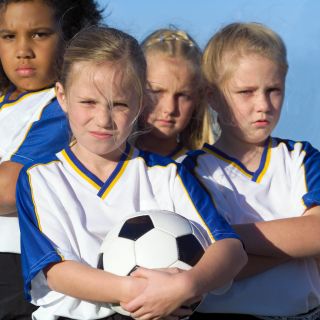Sport and Competition
The End of Sportsmanship?
Eliminating the postgame handshake
Posted October 9, 2013

Yesterday, the Kentucky State High School Athletic Association issued a directive to schools to eliminate organized postgame handshakes. The reason for this directive is that over two dozen fights have occurred during this postgame ceremony in the past three years. There was instant criticism of this decision, but as KSHSAA Commissioner Julian Tackett pointed out, if parents were truly concerned about sportsmanship, then “they wouldn’t treat the referees like they do—chase them off the fields, follow them to cars, not to mention the language that’s used.” Other states have made the same decision, for the same reasons
As someone who is involved with youth soccer as a parent, referee, and coach, I sympathize with the decision. I’ve had parents criticize my decisions as a referee, sometimes in loud and offensive ways. Sometimes they are right; referees make mistakes after all. But often they display their ignorance of the rules. For example, I recently had a parent yell at me that when a player handles the ball in the penalty area, it doesn’t have to be judged as a deliberate hand ball. This is simply wrong, as a look at Law 12 from FIFA’s Laws of the Game makes clear.
Some coaches, and many parents, model terrible behavior towards referees, opponents, and other fans, and often the kids follow suit. Perhaps more often, the kids are embarrassed by their parents’ behavior. Sportsmanship is on the decline, but is the KSHSAA directive the right way to respond? I’m not sure.
I tend to think that in youth sports we should follow the example of soccer at the highest level, where there is a pregame handshake with opponents and referees. Then, after the match, it is up to the players if they want to do this again or not. In this way, we hold onto the value of sportsmanship but don’t create situations in which emotions are still running high and players or coaches are more likely to get into a heated argument or physical fight. Ideally, there would be no need to make such changes to the postgame handshake. Unfortunately, the declining emphasis on sportsmanship may make such a choice the wisest available option.
For a long-term solution, my hope is that there will be a revival of sportsmanship at all levels of sport. Perhaps organizations like the Positive Coaching Alliance will continue to grow and their influence will spread, so that we can engage in postgame handshakes without the likelihood of physical conflict. As the PCA points out, sports can be used to develop better athletes and better people. But we must be intentional about this if we are to succeed in achieving these goals. Perhaps the KSHSAA and other state groups should consult and apply the help that is available from groups like the Positive Coaching Alliance in an effort to nourish and encourage sportsmanship.
I'm on Twitter, @michaelwaustin


